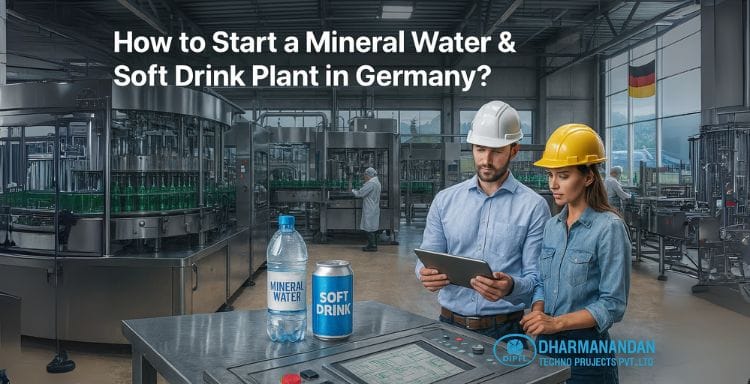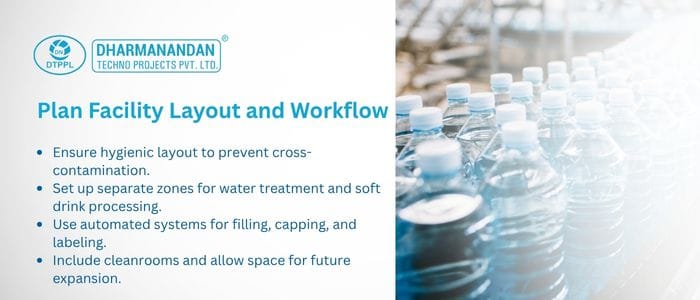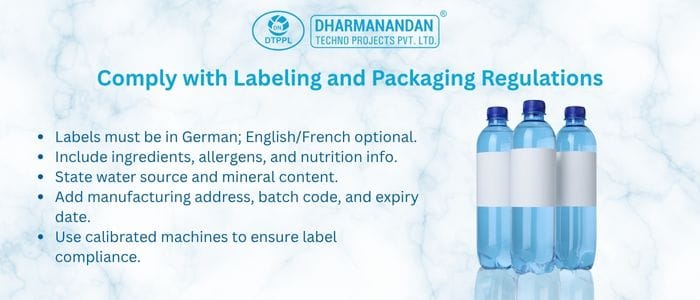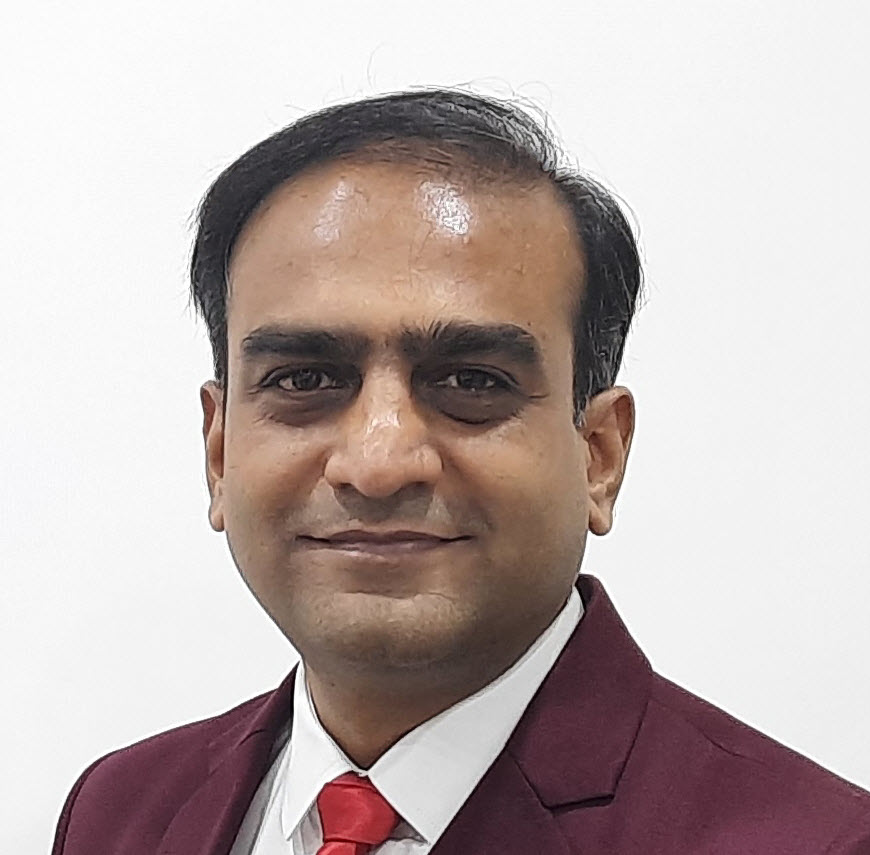
Table of Contents
How to start Mineral Water Plant and Soft Drink Plant in Germany?
June 27, 2025
Germany, with its robust industrial infrastructure and strong regulatory framework, offers a favorable environment for launching a mineral water plant or a soft drinks plant. As demand for bottled water and flavored beverages continues to rise across major cities like Berlin, Munich, Hamburg and Frankfurt, opportunities are emerging for new entrants equipped with technical capability and regulatory awareness. This step-by-step guide outlines the process of starting a Mineral Water Plant in Germany or Soft Drink Plant in Germany, covering every aspect from registration to production setup, with a special focus on technical precision and compliance.
Step 1: Conduct Market Analysis and Define Your Product Portfolio
Begin with a detailed assessment of the beverage demand across German regions. Germany has a well-established consumer base for both still and carbonated mineral water, as well as soft drinks in a variety of flavors and formats.
Key points to consider:
- Popular products include sparkling mineral water, lemon-lime soft drinks, sugar-free sodas and flavored energy drinks.
- Product packaging formats range from 500ml PET bottles to large 5-liter containers for bulk users.
- Evaluate distribution patterns in cities like Cologne, Stuttgart and Leipzig to plan retail and institutional outreach.
Step 2: Choose an Industrial Site and Assess Zoning Permissions
Location selection affects water source quality, logistics, labor availability and regulatory approvals. Regions such as Bavaria, Saxony-Anhalt and North Rhine-Westphalia are known for industrial readiness.
Criteria for site selection:
- Availability of groundwater or municipal water connections for a new mineral water plant.
- Industrial zoning and proximity to highway or rail transport for product distribution.
- Utility infrastructure to support high-capacity soft drink production lines.
Collaborate with local authorities to validate land use and environmental clearances.
Step 3: Apply for Licenses and Environmental Approvals
Germany enforces stringent regulations for food and beverage production. You must secure multiple permits before setting up operations.
Essential licenses include:
- Water Abstraction Permit if drawing from a private source for mineral water.
- Environmental Compliance Certification to address emissions, wastewater and waste disposal.
- Building and Operational Safety Approvals from the Building Office.
Step 4: Plan Facility Layout and Workflow
Your plant layout should support hygienic flow and minimize cross-contamination between soft drinks and mineral water zones.
Facility design elements:
- Water treatment area with multiple filtration stages.
- Separate syrup blending and carbonation section for soft drinks manufacturing.
- Integrated filling, capping and labeling zones equipped with automated conveyors.
- Storage zones for raw materials and packaged goods.
The layout should accommodate modular equipment expansion, with cleanroom controls for mineral water operations.

Step 5: Acquire Machinery and Install Production Lines
Invest in reliable, food-grade machinery to ensure operational efficiency and compliance with German and EU standards.
Key equipment for mineral water production:
- Water purification systems with reverse osmosis, UV treatment and mineralization.
- Mineral water filling machine for accurate and hygienic bottling.
- Labeling and shrink-wrapping units for final packaging.
For Beverages manufacturing:
- Syrup preparation and dosing units.
- Carbonators with temperature and pressure control.
- Soft drinks filling machines designed for PET bottles, glass or cans.
Assess the mineral water machine price in relation to capacity, automation features and service support within Germany.
Step 6: Recruit Technical Staff and Train Operational Teams
Staffing is critical to consistent quality and plant efficiency. Hire professionals experienced in beverage production, engineering and compliance.
Recommended roles:
- Plant Manager and Shift Supervisors
- Quality Assurance Officers
- Maintenance Technicians
- Machine Operators with knowledge of soft drink production lines and filling systems
Implement protocols, train all personnel on hygiene practices and maintain digital logs of production and inspection.

Step 7: Comply with Labeling and Packaging Regulations
Germany requires bilingual labeling (primarily German, with optional English or French). Labels must provide:
- Ingredient list and allergen warnings
- Nutritional information (for soft drinks)
- Water source and mineral content (for mineral water)
- Manufacturing address and batch code
- Expiration or best-before date
Automated labeling machines in your soft drinks plant or mineral water factory must be calibrated to ensure readability and regulatory compliance.
Step 8: Setup Distribution, Logistics and Market Entry
Establish a logistics network for reaching retailers, wholesalers and institutional clients in German cities such as Bremen, Nuremberg and Hanover.
Market entry strategy:
- Begin with regional distribution to test market acceptance.
- Partner with beverage distributors and supermarket chains.
- Attend trade fairs like Anuga or Drinktec to network and present your brand.
Ensure storage and transport conditions protect against temperature fluctuations and bottle damage.
Conclusion
DTPPL’s – Mineral Water Plant in Germany or a Soft Drink Plant in Germany is a highly feasible venture for those prepared with technical knowledge, regulatory understanding and investment in quality machinery. With a structured approach – from registration and location selection to licensing, facility design and production line installation – entrepreneurs can enter one of Europe’s most stable and rewarding beverage markets.
By using precision-driven systems like the mineral water filling machine and fully integrated Beverage production plant, businesses can meet German consumer expectations and regulatory requirements while positioning themselves for scalable growth.
About Author

Director – Global Marketing and Sales
Mr. Bhavesh from Dharmanandan Techno Projects Pvt. Ltd. has played a pivotal role in elevating the DTPPL brand to the global stage, leveraging his exceptional expertise in marketing and communications. He is committed to helping clients achieve significant growth while strengthening their own brands. Dharmanandan Techno Projects Pvt. Ltd. is a leading manufacturer and supplier of water purification systems and turnkey solutions for mineral water plants. With years of experience in designing and delivering high-quality water treatment solutions, the company provides end-to-end services, including system design, installation, maintenance, and ongoing support. Specializing in scalable and customizable water plants, DTPPL has successfully served industries worldwide, ensuring clean and safe drinking water across diverse applications.




